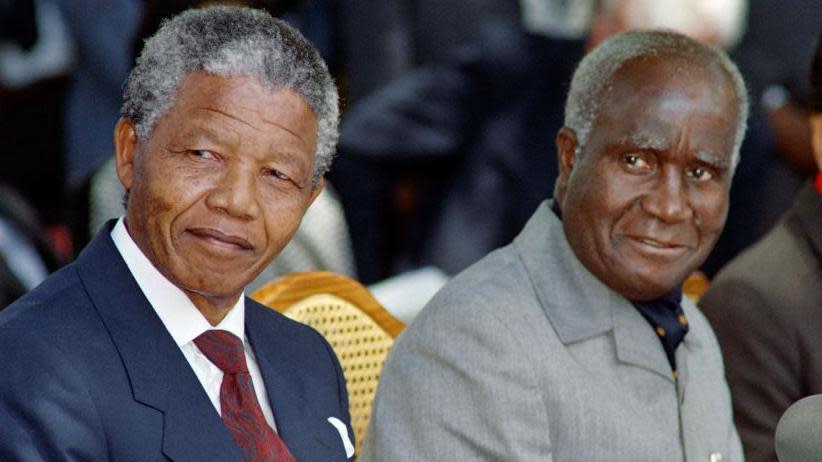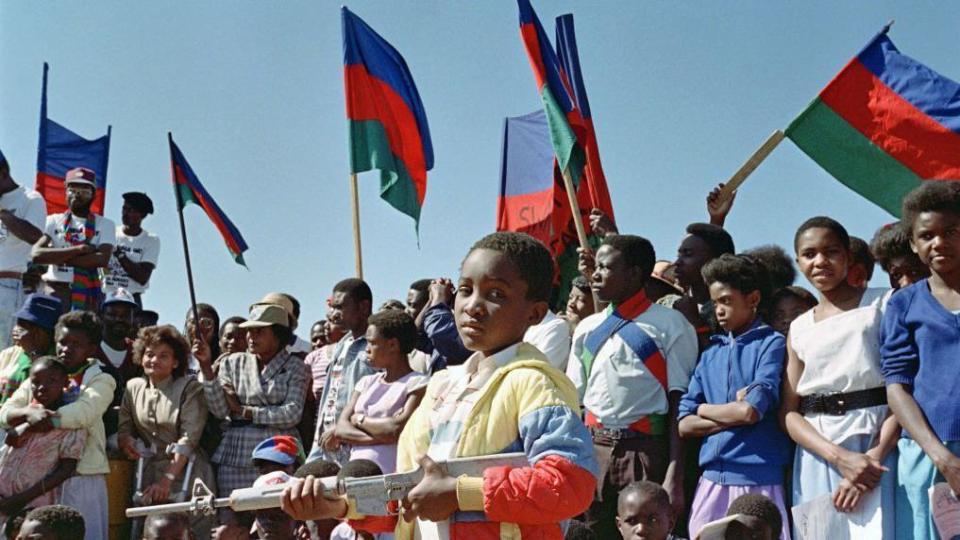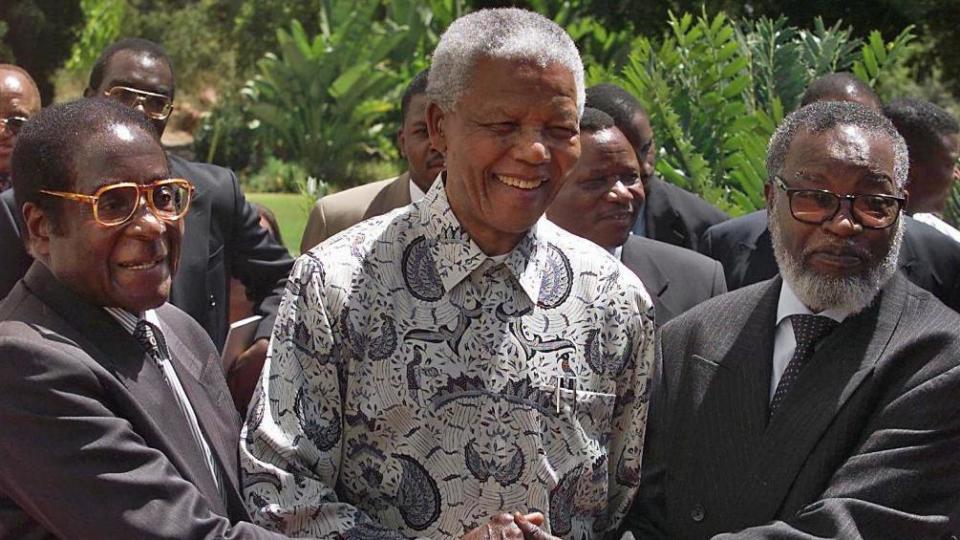Africa’s oldest liberation movement is in trouble and may be going the way of similar groups across the continent.
The African National Congress (ANC) – founded in South Africa more than a century ago – has lost its majority in parliament for the first time in 30 years, although it remains by far the most popular party in the country.
It seems that there were no longer a large number of voters reflexively willing to give their support to Nelson Mandela’s party because it had led the fight against the racist apartheid system.
This reflects the decline of other parties that fought against colonial rule and came to power, which subsequently fell victim to corruption, clientelism and a discontented population thirsting for change.
Some of the liberation movements that remain in power in Southern Africa are accused of doing so only by stealing elections.
“It’s inevitable that people will start wanting change,” said researcher David Soler Crespo, who has written about the “slow death of liberation movements.”
“It is impossible for the same party to be democratically elected for 100 years.”
However, they managed to impose strong control, not only over the power apparatus, but also over the nation’s psyche.
As successful movements transitioned from the bush to the office, they called themselves the only ones who could lead.
They ingrained the movement in the country’s DNA, making it difficult to separate the party from the state.
In Namibia, the phrase “Swapo is the nation, and the nation is Swapo”, used during its struggle against apartheid South African rule, remains strong.

Looking across the region, public officials and government appointees, especially in the security forces and state-controlled media, were often former guerrilla fighters, who may have placed loyalty to the party above the nation.
“There is no line between State and party. It’s more than a party, it’s a system”, said Crespo.
And the legacy of liberation is deeply rooted in the region’s culture, with stories of struggle shared at family dinner tables and in the national media, continually reminding citizens of their hard-won freedom.
Liberation songs and war cries are sung in high schools, even at sports games.
The fact that citizens are moving away from the liberation party is a major psychological problem. But over time this happens.
“People are no longer influenced by history when they vote,” Namibian social scientist Ndumba Kamwanyah told the BBC, reflecting on the decline in support for Swapo, who has been in power since 1990.
Many of the parties have embraced socialist ideologies, but these have often fallen by the wayside over time and people have questioned whether citizens are benefiting equally.
One of the first independence movements in Southern Africa to feel this disdain for history was Zambia’s United National Independence Party (Unip), which came to power in 1964 when British rule ended.
For most of the 1970s and 1980s, it governed the country as the only legal party, with founder Kenneth Kaunda at the helm. But discontent grew and in 1990 there were deadly protests in the capital, Lusaka, and an attempted coup d’état.
The following year, the first multi-party elections in more than two decades saw President Kaunda lose to Frederick Chiluba. Unip, once all-powerful, has now practically disappeared.
Liberation movements in Angola, Mozambique, Namibia and Zimbabwe remain in power, but all have seen a decline in support and vote share in general elections.


In Namibia, 2019 marked a watershed for Swapo, as it lost its two-thirds parliamentary majority.
In the presidential elections, Hage Geingob also suffered a worrying decline in popularity, as his vote share fell from 87% in 2014 to 56%.
The following year, Swapo suffered historic losses in regional and local elections.
Professor Kamwanyah, who campaigned for the party more than 30 years ago, says he maintains a deep respect for what the liberation government achieved in the past, but is disappointed with the current reality.
“What the party is doing does not reflect the original fundamental values that explain why people died for this country,” said the Namibian academic.
Namibia will hold its general elections in November and there is some speculation that it could suffer the same fate as the ANC.
“I think Swapo will win, but he will not get a majority,” said Professor Kamwanyah.
Ndiilokelwa Nthengwe, a 26-year-old Namibian activist, says there has been a generational shift.
“The values of our generation are not aligned with those of the government,” she told the BBC.
Ms Nthengwe has been at the forefront of many social movements in the country.
Young people value sexual and gender equality, she says, along with jobs and better health care.
“All young people want is change, change and more change.”


But while Namibia, along with South Africa, are seen as relatively open democracies, ruling parties in Zimbabwe, Angola and Mozambique have been accused of stamping out dissent in order to maintain their grip on power.
Electoral fraud, suppression of opposition parties and voter intimidation are among its alleged tactics.
Adriano Nuvunga, president of the Southern Defenders Observation Mission, has witnessed elections in Mozambique over the past two decades.
“Every election I have observed since 1999 has been fraudulent,” Nuvunga said.
He says he also saw voter intimidation and vote tampering.
In Zimbabwe in 2008 Amnesty International documented illegal killings, torture and other ill-treatment inflicted on opposition supporters between the first and second rounds of the presidential vote. In fact, most elections in Zimbabwe have been marred by allegations of opposition tampering or intimidation, although this is consistently denied by the ruling party, Zanu-PF.
Following the 2022 elections in Angola, thousands of people took to the streets to protest alleged electoral fraud.
The longer liberation movements remain in power, the more they are accused of corruption and cronyism and of not governing in the interests of the people.
Chris Hani, the late South African anti-apartheid hero, predicted this when he said: “What I fear is that the liberators will emerge as elitists who drive Mercedes Benzes and use the resources of this country to live in palaces and accumulate wealth. ”
But a former Zimbabwean liberation fighter, who asked to remain anonymous, told the BBC that many of the movements did not have enough time to confront the world order.
He highlighted that Europe has endured authoritarian monarchies for centuries and that they have had time to learn and adapt.
“Liberation governments are still playing catch-up in a world that was not designed for them,” he said.
Overthrowing colonial and white minority rule was difficult, but governing brought other challenges.
Leading a revolutionary movement requires obstinacy and strict loyalty, while governing a country requires greater flexibility, collaboration and the ability to balance the interests of different sectors of the population.
Some movements fell short of this. And they may not have much time left.
But Crespo states that if these parties recover the ideals that led them to government, listen to the youth and find themselves again, they may be able to hold on a little longer.




Go to BBCAfrica.com for more news from the African continent.
Follow us on Twitter @BBCAfricaon Facebook at BBC Africa or on Instagram at bbcafrica






































